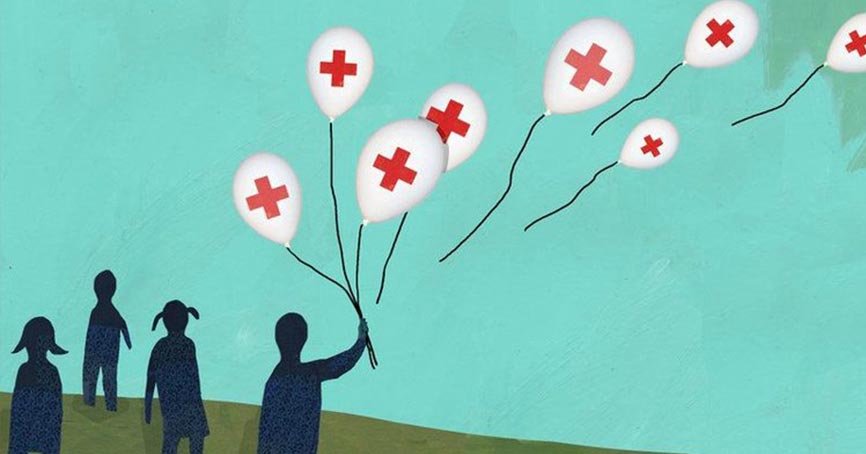Kidney Cancer Overview
Kidney cancer is a disease in which the kidney cells become cancerous and grow out of control forming a tumour. Almost all the kidney cancers make their appearance in the lining of the tubules of the kidney. The good thing here is that maximum cases are identified before they advance to distant organs as kidney cancer symptoms are easily identifiable.
This is helpful during the course of treatment because early diagnosis also means ease of treatment. In certain cases, the tumours grow quite large before detection/ diagnosis.
Kidneys are two bean-shaped organs that are each the size of a fist. Lying in the lower abdomen on each side of the spine, thy work to cleanse the blood, remove waste products to make urine.
Kidney Cancer Causes
Cancer starts when the structure of DNA in cells changes. A genetic mutation causes the cells to grow beyond control that leads to the production of tumour cells. Without proper treatment, cancer grows and spreads, through a series of nodes or glands (lymphatic system) that exist within the body.
Kidney Cancer or Renal Cell Carcinoma usually starts in the cells lining the tiny tubes of the nephron. A tumour usually grows as a single mass, however, more than one tumour may grow in one kidney or both kidneys.
Transitional cell carcinoma usually starts in the tissue that forms the tubes connecting the kidney to the bladder. This cancer type may begin in the uterus or in the bladder itself.
Kidney Cancer Risk factors
There are a number of factors that increase the risk of kidney cancer. Some of them are-
- Old Age- As one grows old, the risk of kidney cancer increases.
- Obesity- Overweight and obese people are at higher risk of kidney cancer than average weight people due to hormone changes.
- High Blood Pressure (hypertension)- High blood pressure increases the risk of kidney cancer.
- Smoking- Smokers are at a greater risk of kidney cancer than nonsmokers, however, the risk decreases after a person quits.
- Exposure to certain substances like cadmium or herbicides.
- Certain inherited syndromes- People born with certain inherited syndromes have an increased risk of kidney cancer like those with Birt-Hogg-Dube syndrome, Hippel-Lindau disease, Familial Renal cancer, Hereditary Papillary Renal Rell carcinoma or Tuberous Sclerosis Complex.
- Being male- Men are twice as likely as women to have kidney cancer.
- A family history of kidney cancer- People who have a strong family history of renal cell cancer have a greater risk of cancer.
- Pain medications for a longer period of time including over-the-counter drugs.
- Lymphoma- There is a high risk of kidney cancer in patients with lymphoma.
- Exposure to certain chemicals like asbestos, benzene, organic solvents, cadmium and herbicides.
Kidney Cancer Symptoms
In the early stages of cancer, the symptoms are not evident, however, they may still be there. The signs and symptoms of Kidney cancer include-
- Blood in urine
- A lump or mass near the abdomen or back
- A loss of appetite
- A pain not going away
- Weight loss for reasons not known
- Anaemia
- Long-lasting fever not caused due to a cold or other infection
- Extreme fatigue
- Swelling in the legs or ankles
If kidney cancer has spread to other parts of the body, there may be other symptoms like-
- Coughing up blood
- Bone Pain
- Shortness of Breath
Prevention of Kidney Cancer
Kidney cancer is a deadly disease, however, taking a few steps to reduce the risk of kidney cancer is not a bad idea. To prevent the disease, here are a few steps one can take.
- Quit Smoking- If you have never smoked, great. If you used to smoke but have already quit, good. If you still smoke, quit NOW. Smoking is harmful not only for kidney cancer but also because one is prone to other forms of diseases. If you are unable to quit the habit, discuss with your doctor right away.
- Maintain a healthy weight- A healthy weight helps to body remain fit and away from any form of diseases. Start by light exercises and reducing the calorie intake to reduce the extra pounds. Also, consult a doctor to understand the healthy strategies to help lose weight.
- Control high blood pressure- Keep a regular check on your blood pressure and if it is high, discuss with the doctor about lowering the numbers. Some of the lifestyle changes one can make include exercise, weight loss, diet and reducing iodine intake would be of great help. Some people also need to lower the medications to lower the blood pressure.
- Other Precautions- Besides the above, one can also take other measures like eating plenty of fruits and vegetables, getting quality sleep for at least 7 hours every 24 hours, maintaining healthy blood pressure and avoiding toxic chemicals.
Moreover, if there is any sort of discomfort or you notice any symptoms it is advisable to visit the doctor at the earliest.
Bibliography
- https://www.mayoclinic.org/diseases-conditions/kidney-cancer/symptoms-causes/syc-20352664
- https://www.webmd.com/cancer/understanding-kidney-cancer#3
- https://www.medicalnewstoday.com/articles/164659.php
- https://medlineplus.gov/kidneycancer.html#cat_93
- https://www.cancervic.org.au/cancer-information/cancer-types/cancer_types/kidney_cancer

 Jun 03, 2019
Jun 03, 2019
 May 30, 2018
May 30, 2018 May 10, 2018
May 10, 2018 May 17, 2018
May 17, 2018